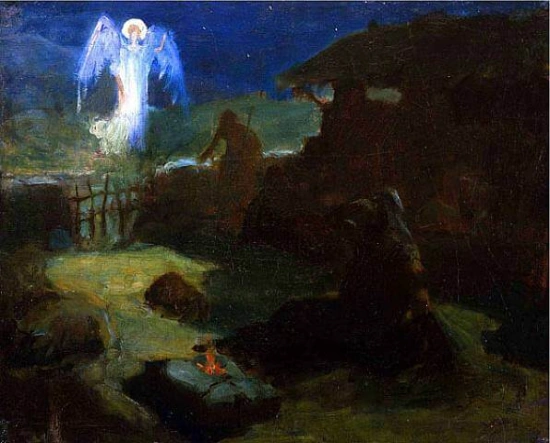173. "'These things says He who is holy, who is true.'" This symbolically means the Lord in relation to Divine truth.
Clearly it means the Lord. He who is holy, who is true, is the Lord in relation to Divine truth, because the Lord is called holy owing to His Divine truth, and called just or righteous owing to His Divine goodness. It is in consequence of this that His emanating Divinity - which is Divine truth - is called the Holy Spirit; and here the Holy Spirit is He who is holy, who is true.
[2] Holiness is often mentioned in the Word, and it is everywhere predicated of truth; and because all truth that is true in itself originates from goodness and from the Lord, it is that truth that is called holy. In contrast, the goodness from which truth originates is called just or righteous. It is owing to this that angels governed by truths of wisdom, called spiritual angels, are termed holy, while angels governed by the goodness of love, called celestial angels, are termed just or righteous. The same is the case with people in the church.
It is because of this also that prophets and apostles are called saints, or holy, for prophets and apostles symbolize the church's doctrinal truths.
It is because of this, too, that the Word is called holy, for the Word is Divine truth. That is why the Law in the ark in the Tabernacle was called the most holy place and also the sanctuary.
That, too, is why Jerusalem is called holy, for Jerusalem symbolizes a church which possesses Divine truths.
For the same reason the altar, the Tabernacle, and the garments of Aaron and his sons were called holy after they were anointed with oil; for oil symbolizes the goodness of love, and this sanctifies or makes a thing holy, and everything made holy relates to truth.
[3] From the following passages it is apparent that the Lord alone is holy, because He is Divine truth itself:
Who shall not... O Lord..., glorify Your name? For You alone are holy. (Revelation 15:4)
...your Redeemer, the Holy One of Israel, the God of the whole earth shall He be called. (Isaiah 54:5)
Thus said Jehovah, the Redeemer of Israel, his Holy One... (Isaiah 49:7)
As for our Redeemer, Jehovah of Hosts is His name, the Holy One of Israel. (Isaiah 47:4)
Thus said Jehovah, your Redeemer, the Holy One of Israel... (Isaiah 43:14)
...in that day... they will depend on Jehovah, the Holy One of Israel, in truth. (Isaiah 10:20)
And also elsewhere, as Isaiah 1:4; 5:19; 12:6; 17:7; 29:19; 30:11-12; 41:16; 45:11, 15; 48:17; 55:5; 60:9, Jeremiah 50:29, Daniel 4:13, 23, Psalms 78:41.
Since the Lord is holiness itself, therefore the angel said to Mary,
...the holy thing that will be born of you shall be called the Son of God. (Luke 1:35)
And regarding Himself the Lord said,
(Father,) sanctify them with the truth. Your word is truth... ...for their sakes I sanctify Myself, that they also may be sanctified with truth. (John 17:17, 19)
[4] It is apparent from this that the truth that comes from the Lord is holiness itself, because He alone is holy - concerning which the Lord says the following:
When... the Spirit of Truth has come, He will guide you into all truth. ...He will not speak on His own... ...He will take of what is Mine and declare it to you. (John 16:13-15)
The Counselor, the Holy Spirit..., He will teach you all things... (John 14:26)
To be shown that the Holy Spirit is the life in the Lord's wisdom, thus Divine truth, see The Doctrine of the New Jerusalem Regarding the Lord 51.
It can be seen from this that He who is holy, who is true, is the Lord in relation to Divine truth.
That holiness is predicated of truth, and justice or righteousness of goodness, is apparent from passages in the Word where the two are mentioned, as in the following:
He who is just, let him be just still; he who is holy, let him be holy still. (Revelation 22:11)
Just and true are Your ways, O King of saints! (Revelation 15:3)
...to serve Him, in holiness and righteousness. (Luke 1:75)
...Herod feared John, knowing that he was a just and holy man... (Mark 6:20)
...the fine linen is the righteous acts of the saints. (Revelation 19:8)







